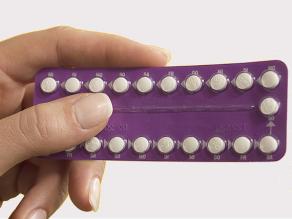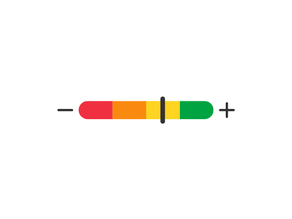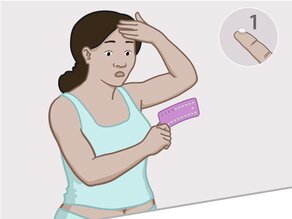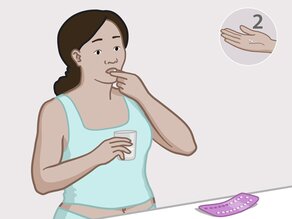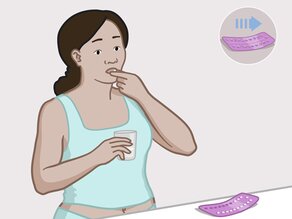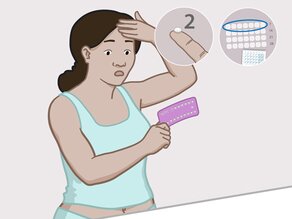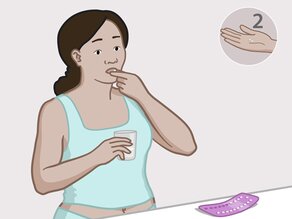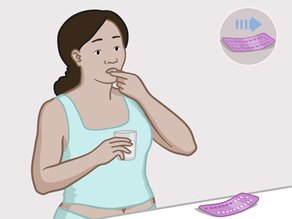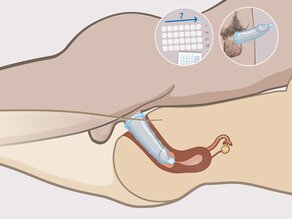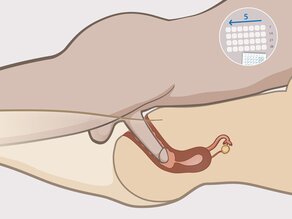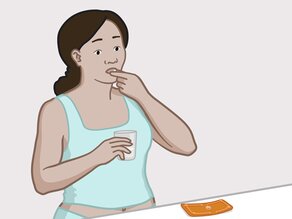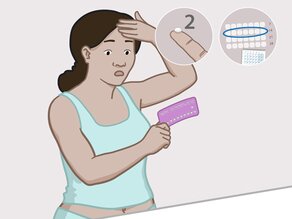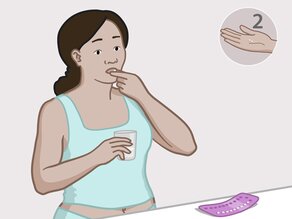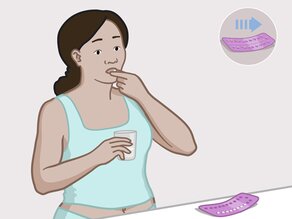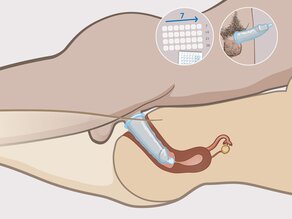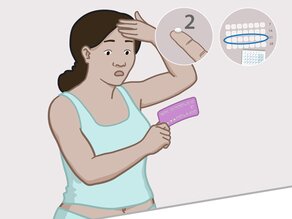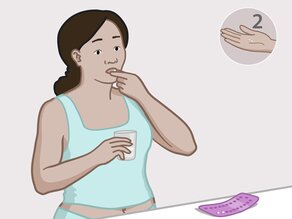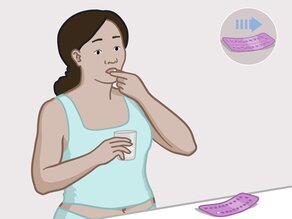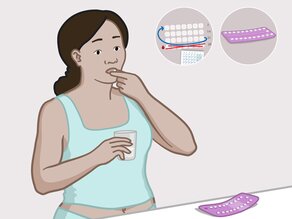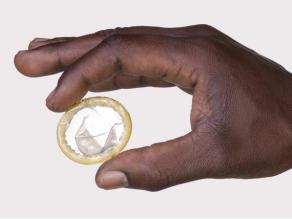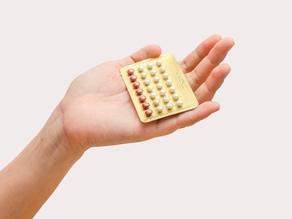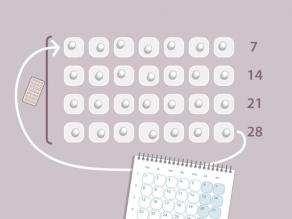Contraceptive pill
The contraceptive pill is a method of contraception.
The contraceptive pill is usually a pack containing 21 or 22 pills. Sometimes it contains 24 or 28 pills. There are many different types of packaging (different colours, rectangular, round, etc.).
The contraceptive pill contains 2 hormones. These hormones prevent ovulation. They also make it more difficult for sperm cells to enter the uterus.
There is also a contraceptive pill that contains 1 hormone, the mini-pill.
How to take the contraceptive pill
A pack with 21 pills should be used in the following way:
- Take 1 pill every day at the same time. The days of the week are usually marked on the back of the pack. You can check that you did not forget to take a pill.
- After 21 days (3 weeks) the pack is finished.
- For the next 7 days (1 week), you do not take any pills. This week you will begin to lose blood from the vagina (menstrual period). You are also protected in this week.
- After 7 days (1 week) you start a new pack of pills, even if you are still bleeding.
- Continue following the previous steps.
Reliable
The contraceptive pill is reliable. Around 9 in 100 women get pregnant when they take the contraceptive pill for 1 year.
The contraceptive pill can be less reliable, if:
- You do not always take it at the same time (especially if you take the pill more than 12 hours after the time you usually take it);
- You vomit within 2 hours of taking the pill;
- You are taking certain medicines such as St John’s Wort. Tell your doctor you are taking the contraceptive pill. He will take this into account when prescribing medicines.
- Do not forget to take a pill.
Use a condom if you have sexual intercourse and the contraceptive pill is less reliable.
Only taking a contraceptive pill on the days that you have sexual intercourse is not reliable at all.
What to do if you forgot to take 1 pill?
- Take the contraceptive pill as soon as possible, even if it means taking 2 pills on the same day.
- Continue to take the rest of the pills in the pack as usual.
- You are protected against unintended pregnancy.
- You do not need emergency contraception if you had unprotected sex in the past few days.
What to do if you forgot to take 2 or more pills? - In the first week of the pack (day 1 to 7)
- Take the last missed pill as soon as possible, even if it means taking 2 pills on the same day.
- Continue to take the rest of the pills in the pack as usual.
- Also use a condom when having sexual intercourse in the next 7 days.
- If you had unprotected sex in the previous 5 days and you do not want to get pregnant, take emergency contraception as soon as possible.
What to do if you forgot to take 2 or more pills? - In the second week of the pack (day 8 to 14)
- Take the last missed pill as soon as possible, even if it means taking 2 pills on the same day.
- Continue to take the rest of the pills in the pack as usual.
- Also use a condom when having sexual intercourse in the next 7 days.
- You do not need emergency contraception if you had unprotected sex in the past few days.
What to do if you forgot to take 2 or more pills? - In the third week of the pack (day 15 to 21)
- Take the last missed pill as soon as possible, even if it means taking 2 pills on the same day.
- Continue to take the rest of the pills in the pack as usual.
- If the pack is finished, immediately start a new pack the following day. Do not take a 7-day break.
- Also use a condom when having sexual intercourse in the next 7 days.
- You do not need emergency contraception if you had unprotected sex in the past few days.
If you forgot to take 2 or more pills in different weeks of the pack, ask a healthcare professional for help.
If you frequently forget to take a pill, you can use something to help you remember or talk to a doctor about a different method of contraception.
Does not affect your health
It contains hormones. These hormones do not generally affect your health. However, in some cases it is better to choose a different method of contraception. Ask a doctor for advice.
The contraceptive pill does not make you less fertile. If you want to get pregnant, just stop taking the pill.
Taking the pill will not make you gain weight.
Taking the pill will not make you gain more body hair.
During the first months that you take the contraceptive pill, the pill may cause side-effects such as tender breasts, minor bleeding between 2 menstrual periods, headaches and nausea. These effects usually disappear on their own. If they do not disappear, consult a doctor. There are different kinds of contraceptive pills. Together with a doctor, you can find the contraceptive pill most suitable for you.
Your menstrual periods often become less heavy and less painful.
No protection against HIV and STIs
The contraceptive pill does not protect against STIs or HIV. Only a condom can protect you.
Mini-pill
You can also take the mini-pill. It is similar to the regular contraceptive pill, but a pack of mini-pills contains 28 pills instead of 21.
The mini pill contains 1 hormone. The hormone makes it more difficult for sperm cells to enter the uterus and reach the egg cell.
You can take the mini-pill if you are breast-feeding.
The most common side-effects of the mini-pill are irregular menstrual periods and bleeding between 2 menstrual periods.
How to take the mini-pill
Take the mini-pill in the following way:
- Take 1 pill every day at the same time;
- When you finish a pack after 28 days (4 weeks), start a new one the next day. You continue to take the mini-pill during your menstrual period.
The mini-pill is less safe if you forget to take it for more than 12 hours after your usual time.
Buying the contraceptive pill
You need a prescription from a doctor to buy the contraceptive pill. You cannot buy the contraceptive pill without a prescription. You can buy the contraceptive pill in a pharmacy only.
In Belgium, there are various kinds and brands of contraceptive pill available. These vary greatly in price. Ask a healthcare professional for more information.
It is difficult to say how much the mini-pill costs. There are many brands and these vary greatly in price. Ask a healthcare professional for more information.
Some health insurance funds repay part of the costs for contraception. Ask your health insurance fund about this.
You also have to pay a personal contribution for the visit to the doctor. Some people have a right to increased reimbursement or urgent medical care. Below are the addresses where you can see a doctor for free.

